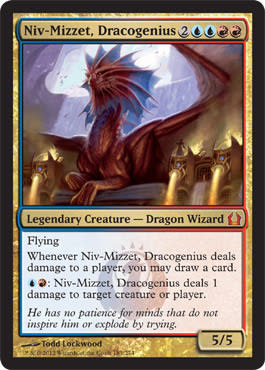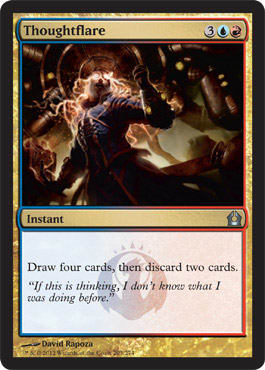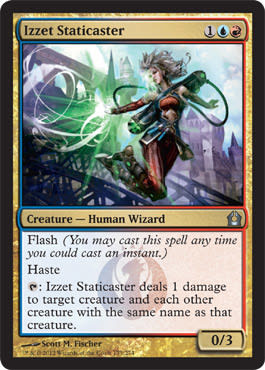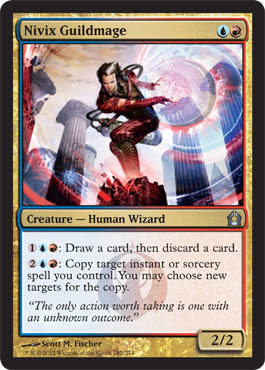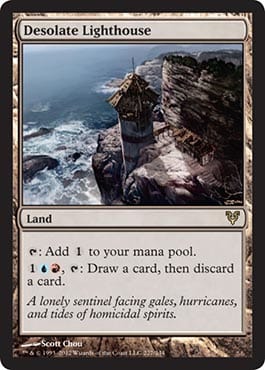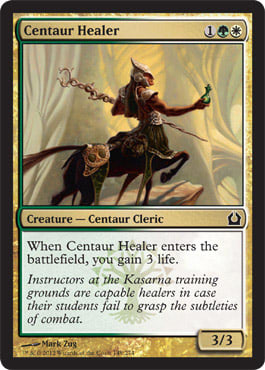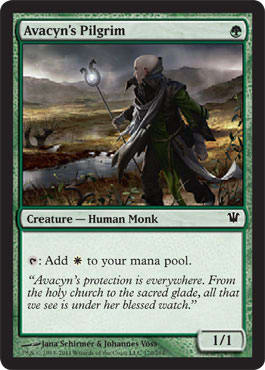I think we've all had our fill of Izzet puns over the last couple months, so I'll avoid making all the obvious jokes here. Despite its groan-inducing name, the guild of mad science has some great tools to offer up for Standard. Niv-Mizzet, Dracogenius seems to be a very good finisher for a control deck, with the ability to close out games fairly quickly, kill off small threats, and draw extra cards to keep answers at the ready. Izzet Charm is similarly versatile, giving you a way to deal with fast creatures, counter important spells such as planeswalkers, and dig through your deck a little. Using these and several other Izzet cards, I put together a control deck with a fairly reasonable price tag.
"Izzet Control"
- Creatures (6)
- 2 Sphinx of Uthuun
- 4 Niv-Mizzet, Dracogenius
- Spells (28)
- 2 Counterflux
- 2 Syncopate
- 2 Thoughtflare
- 4 Dissipate
- 4 Izzet Charm
- 4 Think Twice
- 3 Pillar of Flame
- 4 Mizzium Mortars
- 3 Cyclonic Rift
- Lands (26)
- 7 Mountain
- 9 Island
- 2 Desolate Lighthouse
- 4 Evolving Wilds
- 4 Izzet Guildgate
- Sideboard (15)
- 3 Tormod's Crypt
- 3 Izzet Staticaster
- 3 Negate
- 3 Nivix Guildmage
- 3 Searing Spear
Niv-Mizzet, Dracogenius is the card that made me want to give this deck a shot. Despite being called out as a great control finisher in many early set reviews, it has managed to avoid the spotlight so far. That's good news for us since despite being a mythic rare and a strong potential commander, it can be currently be obtained without too much expense. Niv-Mizzet's main strength is its potential as not only a finisher, but a card-drawing engine. If you are able to untap with a copy on the battlefield, you can draw an extra four cards that turn, one from the attack and three from your 6 available mana. Those extra cards can help you protect yourself and your Dragon, and the extra points of damage can help you end the game in three turns rather than four.
Sphinx of Uthuun is a decent secondary win condition. Although it's undoubtedly less powerful than Niv-Mizzet, it still gives you some of that all-important card advantage when it enters the battlefield. Having another pair of creatures in the deck ensures that you'll be able to draw a second one when your opponent is able to kill the first, and it prevents you from being gutted by a single Slaughter Games.
Although Izzet Charm is somewhat below par on each of its individual modes, the complete package is more than worth it. It gives you options, and options are extremely important in a control deck. More than that, each of its modes is an effective answer for a particular kind of problem. Fast creatures eating at your life total? Have a Shock. Big spell threatening to swing the balance in your opponent's favor? Have a Spell Pierce. Having mana problems? A Faithless Looting should help sort those out. When the three modes are combined, you have a solution for a staggering number of potential situations. Although Izzet Charm may not be the coolest kid on the block, it always does exactly what you need it to.
Syncopate adds to your early defense, giving you the potential for a counterspell on turn two. Although you'll sometimes need to pump a bit more mana into it, you will often be able to counter a spell for just 2 mana, making it easier to do other things in the same turn, such as cast a Think Twice or an Izzet Charm.
Dissipate gives you a hard answer to your opponent's spells, letting you counter almost anything, no matter how large or how small, for just 3 mana. Like Syncopate, it exiles the countered spell rather than put it in the graveyard, preventing your opponent from taking advantage of flashback on spells such as Lingering Souls, Unburial Rites, and Snapcaster Mage.
The inclusion of Counterflux is essentially a few extra copies of Dissipate. Although it doesn't stop flashback, it does prevent your opponent from answering your answer, which can be remarkably relevant against other control decks. The overload ability will rarely come into play, if ever, but it's really just a little bonus tacked onto an already solid card.
Cyclonic Rift helps you deal with anything that slips between the cracks of your counterspells, halting progress momentarily and giving you another shot at Dissipating the problem. It also wreaks havoc on exalted creatures, especially Sublime Archangel, often acting as almost a Time Walk against an opponent who walks into your trap.
Think Twice has been a staple of control decks throughout both of its tours in Standard, allowing the control player to do something useful if the opponent doesn't play anything worthy of countering. It gives you an important bit of card advantage, helping you keep up your defenses long enough to take over the game with a big finisher.
Thoughtflare is a card I've been eager to test out. Although more expensive than what you'd usually expect from a card-drawing spell, four extra cards is a lot, even if you have to dump your two worst ones. Like Think Twice, Thoughtflare is an instant and gives you an effective way to spend any unused mana at the end of an opponent's turn.
Pillar of Flame is your best answer for fast creatures such as Rakdos Cackler, Diregraf Ghoul, and Gravecrawler. It lets you trade with them one for one—a card for a card and a single mana for a single mana—before they start dishing out damage. It also deals with creatures such as Avacyn's Pilgrim that threaten to jump your opponent ahead of you in terms of mana production.
Mizzium Mortars deals with most creatures in the format and for only 2 mana. Restoration Angels and Loxodon Smiters can be shot down quite easily, and you can even take out a Wolfir Silverheart if you get rid of its friend with something such as Cyclonic Rift. When overloaded, Mizzium Mortars accompanies Cyclonic Rift in fulfilling the sweeper function that's often lacking without white to give you access to Supreme Verdict and Terminus.
The Sideboard
Tormod's Crypt plays its usual role as a card against Unburial Rites, giving you what often amounts to a free counterspell against reanimator decks. Although slightly vulnerable to artifact destruction such as Naturalize, your opponent can only control the damage, forcing you to activate the Crypt before the opportune moment. You'll still get rid of whatever previously made its way into the graveyard, setting back your opponent's game plan.
Izzet Staticaster is an amazingly powerful weapon against Lingering Souls, wiping out any number of Spirit tokens at instant speed for only 3 mana. It also has enough toughness to block smaller ground creatures indefinitely, and it can be used to eliminate mana-producing creatures as well, although not until slightly later than you'd like.
Negate stops important spells such as Sphinx's Revelation and Jace, Architect of Thought from resolving, and it can even take down more ambitious spells such as Door to Nothingness and Nicol Bolas, Planeswalker. It also costs only 2 mana, making it easier to cast another spell and still leave mana open.
Nivix Guildmage is an odd little card that has yet to poke its head outside of Limited. I'd like to give it a shot as a weapon against other control decks. It comes down early, usually sneaking in before your opponent has a counterspell online, and it gives you a small threat. Although 2 damage per turn might not seems like much, even those tiny hits will kill your opponent eventually if he doesn't burn a removal spell on the Guildmage, and that can help clear the way for your big finisher. While it eats away at your opponent's life total, Nivix Guildmage can help filter your draws, making sure that you have the answers you need and giving you a steady advantage in card quality over your opponent. Later in the game, the Mage's second ability becomes useful, allowing you to double up on a Think Twice or Izzet Charm to help you find what you need to win the game.
Searing Spear comes in for Pillar of Flame for matchups in which the extra damage is important or in which you want another instant-speed burn spell. Although it costs twice as much, saving yourself from a bunch of exalted triggers from Sublime Archangel or from the double-strike-giving power of Silverblade Paladin can often be crucial to survival.
Playtesting
Naya Midrange – Game 1
I won the roll and kept a hand of Izzet Guildgate, Evolving Wilds, Island, Syncopate, Counterflux, Mizzium Mortars, and Izzet Charm. I played my Guildgate and passed the turn, and my opponent played a Rootbound Crag before passing back.
I drew a Mountain and played my Evolving Wilds before passing the turn. My opponent played a Plains and cast Farseek, fetching a Temple Garden. He ended his turn, and I sacrificed my Evolving Wilds for a Mountain.
I drew Syncopate, played an Island, and passed the turn. My opponent played a Sunpetal Grove and cast Huntmaster of the Fells, which I countered with a Syncopate. He ended his turn.
I drew another Izzet Charm, played my Mountain, and passed the turn. My opponent played Kessig Wolf Run and cast Centaur Healer. I countered it with Syncopate, and he cast Farseek to find a Mountain before ending his turn.
I drew a Desolate Lighthouse, played it, and passed the turn. My opponent played a Sunpetal Grove and cast Garruk, Primal Hunter, which I nailed with Counterflux. He played an Avacyn's Pilgrim and ended his turn.
I drew an Island, played it, and passed the turn. My opponent played a Cavern of Souls naming Beast, then attacked with Avacyn's Pilgrim, pumping it up to a 6/1 with Kessig Wolf Run. I killed it with an Izzet Charm, and he passed the turn. I activated Desolate Lighthouse during his end step, drawing and discarding an Island.
I drew a Mountain and ended my turn. My opponent cast an Avacyn's Pilgrim before passing back, and I activated Desolate Lighthouse during his end step. He cast a Restoration Angel in response, and I drew Thoughtflare, discarding my Mountain.
On my turn I drew Pillar of Flame, then overloaded a Mizzium Mortars to get rid of my opponent's creatures. My opponent passed the turn with no play, and I drew Think Twice before doing the same. He played a Sunpetal Grove before ending his turn, and I cast Thoughtflare, drawing a Cyclonic Rift, Niv-Mizzet, Dracogenius, and two lands. I discarded a Mountain and a Pillar of Flame, then untapped and drew a Mountain for my turn.
I played my Island and cast Niv-Mizzet before ending my turn. My opponent cast Huntmaster of the Fells, gaining 2 life and making a Wolf token. He then ended his turn.
I drew an Island, played my Mountain, and dropped my opponent to 17 with Niv-Mizzet. I drew Think Twice from the Dragon's ability and killed the Huntmaster with Izzet Charm before ending my turn. My opponent played a Cavern of Souls, naming Angel, then attacked with his token, pumping it to a 5/2 with Kessig Wolf Run. I killed it with Niv-Mizzet, and he ended his turn.
I drew Mizzium Mortars and played my Island. The Dracogenius flew in for another 5, giving me a Dissipate. I ended my turn. My opponent cast a Thragtusk with his Cavern of Souls, going back up to 17. He ended his turn, and Niv-Mizzet fired off three shots at the Beast. Restoration Angel came down through a Cavern in response to the last one, but I had another 2 mana to kill the Beast anyway.
I drew another Mizzium Mortars and overloaded it to deal with my opponent's creatures, then attacked for 5 with Niv-Mizzet. I drew an Izzet Guildgate, played it, and ended my turn. My opponent cast another Thragtusk, gaining back the 5 life. He ended his turn, and I shot him once with my Dragon, drawing another Guildgate.
I drew Evolving Wilds for my turn and attacked with Niv-Mizzet, drawing an Izzet Charm. I killed the Thragtusk with Mizzium Mortars, played the Guildgate, and ended my turn. My opponent attacked with the Beast token, pumping it up with Kessig Wolf Run, but I simply bounced it away with Cyclonic Rift. He ended his turn, and I shot him twice with the Dragon, drawing another Dracogenius and a Sphinx of Uthuun.
On my turn, I swung in for 5 with Niv-Mizzet, then finished off my opponent with the Dragon’s ability.
Sideboarding:
Game 2
I kept a hand of two Mountains, two Evolving Wilds, Counterflux, Cyclonic Rift, and Niv-Mizzet, Dracogenius. My opponent started out by playing a Cavern of Souls naming Human and casting Avacyn's Pilgrim. He passed the turn, and I drew an Island, played Evolving Wilds, and passed back.
My opponent played a tapped Sunpetal Grove and attacked for 1 before ending his turn, at which point I sacrificed my Evolving Wilds for an Island. I drew Dissipate, played my other Evolving Wilds, and ended my turn.
My opponent played another Cavern of Souls, naming Angel this time, and cast Centaur Healer. He passed the turn, and I cracked my Wilds for a Mountain. I drew Izzet Guildgate, played my Island, and ended my turn.
My opponent hit me for 3 with Centaur Healer, then played a Rootbound Crag and passed the turn. I drew an Island, played Izzet Guildgate, and ended my turn.
My opponent flashed in a Restoration Angel with Cavern of Souls protection, then untapped and attacked for 7 with his creatures. I took the damage, and he played a Forest, cast Avacyn's Pilgrim, and ended his turn. I bounced Centaur Healer with Cyclonic Rift during his end step, then drew Mizzium Mortars for my turn. I played an Island and passed.
My opponent attacked with everything, dropping me to 4. He then cast his Centaur Healer again and passed the turn. I drew an Island, played my Mountain, and cast an overloaded Mizzium Mortars. The Pilgrims and Centaur Healer died, but my opponent saved his Restoration Angel with a Selesnya Charm. I ended my turn.
My opponent dropped me to 1 with his Angel, played a Cavern of Souls naming Centaur, and cast an uncounterable Centaur Healer. He passed the turn, and I drew a Dissipate and conceded.
Game 3
My opponent and I each took a mulligan, and I kept a hand of three Islands, Think Twice, Dissipate, and Cyclonic Rift. I started things off with an Island, and my opponent played a Forest and cast Avacyn's Pilgrim.
I drew Cyclonic Rift, played an Island, and passed the turn. My opponent played a Plains and cast Centaur Healer. He ended his turn, and I bounced the Centaur with Cyclonic Rift.
I drew Syncopate, played my Island, and ended my turn. My opponent cast Centaur Healer again, and I countered it with a Syncopate for 2. He hit me for 1 with Avacyn's Pilgrim and passed the turn.
I drew Thoughtflare and ended my turn. My opponent cast Borderland Ranger, searched for a Forest, played it, and cast Farseek, grabbing a Temple Garden. He ended his turn, and I cast Think Twice, drawing an Izzet Guildgate.
I drew Izzet Charm for my turn, played the Guildgate, and passed. My opponent attacked both creatures for 3, then cast Thragtusk, which I countered with Dissipate.
He ended his turn, and I drew an Island, which I played before passing back. My opponent attacked for 3 again, then cast another Borderland Ranger, finding a Mountain and playing it. He ended his turn, and I cast Thoughtflare, drawing two Izzet Guildgates, an Evolving Wilds, and an Island. I discarded one Guildgate and the Evolving Wilds, and I drew another Izzet Charm for my turn.
I played the Guildgate and passed the turn. My opponent played a Sunpetal Grove and attacked with everything. I cast Izzet Charm in Shock mode on a Borderland Ranger, and my opponent pumped it with Selesnya Charm in response. I dropped to 6, and my opponent passed the turn. I flashed back Think Twice during his end step and drew Desolate Lighthouse.
I drew Niv-Mizzet, Dracogenius for my turn, then played the Lighthouse and passed. My opponent attacked with everything, pumping up Avacyn's Pilgrim with a Selesnya Charm to make it lethal. I overloaded a Cyclonic Rift to return everything to his hand, and he recast a Borderland Ranger, finding a Plains and playing it, then recast the second Ranger along with two Avacyn's Pilgrims to put lethal damage on the board again.
I drew Think Twice and cast it, drawing a Mountain. I played it, then killed a Borderland Ranger with Izzet Charm. I ended my turn. My opponent dropped me to 2, then cast another Borderland Ranger and passed the turn. I flashed back Think Twice, drawing Mizzium Mortars.
I drew another Niv-Mizzet for my turn, played my Island, and cast Mizzium Mortars for its overload cost to clear the board. I passed the turn, and my opponent played a Temple Garden and cast Angel of Serenity, exiling the trio of Borderland Rangers from his graveyard before ending his turn.
I drew a Mountain, played it, and cast Niv-Mizzet, Dracogenius. I passed the turn. My opponent attacked with Angel of Serenity, and I blocked with Niv-Mizzet, pinging the Angel for the last point of damage and pinging my opponent to draw a card. I drew Sphinx of Uthuun, and my opponent put his Rangers back in his hand. He cast all of them and passed the turn.
I drew Searing Spear for my turn and figured out that my only means of survival was to cast the Sphinx and hope my opponent put a Searing Spear, Mizzium Mortars, or Cyclonic Rift in the same pile as a basic land. Unfortunately, my opponent saw through my plans and made sure that the Cyclonic Rift and the Island I found in the top five were in two different piles. I died to Rangers on his turn.
Wrap-Up
Although I lost the match, the deck performed fairly well, despite having some difficulty with Cavern of Souls. The troublesome land certainly makes things tougher for this deck, but it is possible to fight through it, provided your opponent can't make every creature uncounterable. If Cavern of Souls isn't prevalent in your area or if you just want to kill your opponents with the great Niv-Mizzet, take this deck for a spin.
As always, if you have any questions or comments, you can find me on the forums under Twinblaze, on Twitter under @MTGCannon, or simply leave a comment below.













